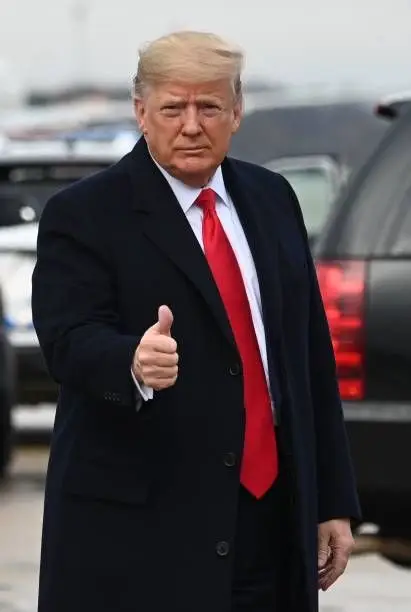
Donald Trump: The Unprecedented Journey of the 45th President of the United States

The 45th President of the United States, Donald Trump, is a person who will never be forgotten in American politics. Throughout his career, Trump has been known for his unconventional leadership style, tenacity, and controversy. These traits have been evident in both his early days as a real estate entrepreneur and his time in the White House. This blog examines his professional background, personal life, and legacy.
Donald Trump Early Life and Business Career
On June 14, 1946, Donald John Trump was born in Queens, New York City. Growing up in an affluent family, Trump was first exposed to the real estate industry through his father, renowned developer Fred Trump. Following his 1968 graduation from the University of Pennsylvania’s Wharton School, Trump went on to work for his family’s company, the Trump Organization.
Trump started establishing himself in Manhattan in the 1970s by taking on significant real estate ventures. One of the most significant of them was the conversion of the run-down Commodore Hotel into the Grand Hyatt, which signaled the start of his ascent in the real estate industry. Trump grew his commercial empire in the 1980s and 1990s by making investments in hotels, casinos, and golf courses. He also became a household name in the process.
Donald Trump The Celebrity Apprentice and Media Presence
In 2004, Trump hosted the reality TV series “The Apprentice,” which solidified his already-established celebrity. The program, which pitted prospective businesspeople against Trump for a position, was a huge hit and made Trump’s slogan, “You’re fired!” well-known. He became more and more visible in the media, becoming a household name in the US.
Trump’s public persona was greatly influenced by his ability to use the media and his brand. One of his books, “The Art of the Deal,” helped to establish his reputation as a shrewd businessman and dealmaker.
Political Ascent and Presidential Campaign
Although Trump’s political aspirations were obvious in the early 2000s, he didn’t seriously pursue the presidency until the 2016 election. As a Republican, Trump’s campaign was distinguished by its unconventional strategy, which included strong language and an emphasis on matters such as immigration, trade, and national security.
A sizable section of the American public found resonance in Trump’s message, despite resistance from inside his party and mistrust from political professionals. “Make America Great Again,” his campaign slogan, served as a rallying cry for his followers. In a historic and unexpected victory, Trump defeated Democratic candidate Hillary Clinton on November 8, 2016, to win the presidency.
The Trump Presidency: Policies and Controversies
One of the most divisive administrations in recent American history was that of Donald Trump. Significant improvements were made under his administration in a number of sectors, including:
Economy: Deregulation and tax cuts, particularly the Tax Cuts and Jobs Act of 2017, were Trump’s top priorities. During his presidency, unemployment fell to record lows, and these programs were intended to boost economic growth.
Immigration: Trump’s extreme approach on the subject is demonstrated by his construction of a wall along the U.S.-Mexico border and his travel ban on certain nations with a large Muslim population.
Foreign Policy: Because of his “America First” stance, trade agreements like NAFTA were renegotiated and eventually replaced by the USMCA. Along with engaging in previously unheard-of diplomatic outreach with North Korea, Trump also withdrew from multilateral accords such as the Iran Nuclear Deal and the Paris Climate Accord.
Justice: Trump changed the ideological balance of the Supreme Court by appointing three justices: Amy Coney Barrett, Brett Kavanaugh, and Neil Gorsuch.
Nevertheless, a number of issues and scandals dogged Trump’s presidency, such as:
Impeachments: The House of Representatives twice removed President Trump from office, once in 2019 for misusing his authority and obstructing Congress and again in 2021 for inciting a rebellion in the wake of the Capitol riot on January 6. The Senate cleared him both times.
Managing the COVID-19 Pandemic: There was a lot of criticism directed at Trump’s handling of the pandemic. Although Operation Warp Speed sped up the creation of vaccines, his management of public health precautions and virus information came under intense criticism.
Racial and Social Unrest: During the Trump administration, there was a noticeable increase in racial tensions and social unrest. Events like the Charlottesville rally and the Black Lives Matter demonstrations garnered national attention and prompted condemnation of his actions.
Following the Presidency and Persistent Impact
Following his resignation in January 2021, Trump continued to be a significant player in US politics. Political divides persisted as a result of his accusations of election fraud and his unwillingness to give Joe Biden the 2020 election. Trump kept swaying the Republican Party by supporting politicians and directing the organization’s course.
Trump established Truth Social, a new social media site, in 2022 with the goal of fostering free speech and combating what he saw as mainstream platforms’ perceived repression. His public remarks and political gatherings imply that he might think about running for president again in 2024.
Legacy and Impact
The legacy of Donald Trump is a hotly contested subject. His admirers see him as a revolutionary who stood up to the political establishment and promoted measures that bolstered national security and the economy. Opponents counter that his polarizing words and deeds strengthened societal divisions and threatened democratic institutions.
Whatever one’s viewpoint, there is no denying Trump’s influence on US politics. His administration changed the Republican Party, affected political debate, and had a long-lasting effect on the history of the country.
[…] Donald Trump […]